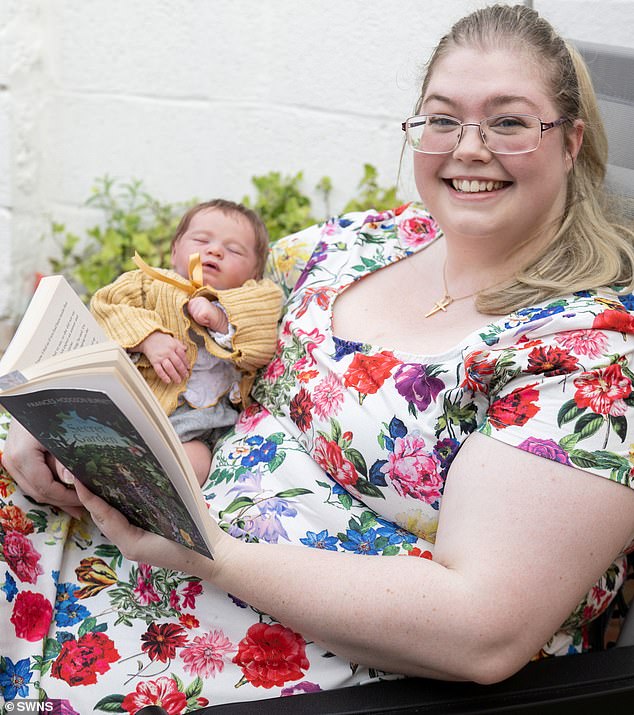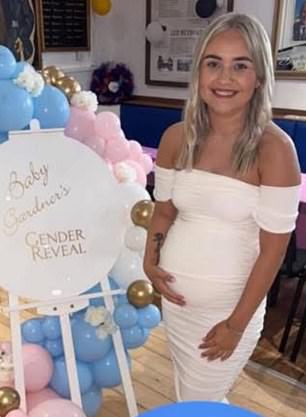When a brand new ‘reborn’ baby – the hyper-realistic dolls that look and feel like a real newborn, is delivered to their ‘parent’, a ceremonious ‘box opening’ usually takes place.
The dolls, often crafted by specialist artists and ranging in price from the low hundreds to around £20,000, arrive wrapped in cellophane, with a nappy on their heads, swaddled in a blanket and with a certificate of authenticity from the maker included.
The dolls, which are crafted in vinyl or silicone and then painstakingly painted by hand, often include features that make them appear unnervingly realistic – from cute wrinkles and creases to battery-operated ‘breathing machines’, human hair that’s rooted strand-by-strand and a baby powder scent.
Parents of the dolls often follow the same ‘reveal’ pattern when meeting their new arrival, with feelings of joy and elation common.
Reborn collector and artist Zoe Miller, 48, from Bury St Edmunds, explains that most owners will build up the excitement and won’t glimpse their new doll’s face until the very last moment they can.
‘It’s a box of joy, you don’t unwrap the baby all in one go, you look at the feet first, then admire the hands, the arms… and you do the face reveal last’.
The mother-of-six, who has multiple sclerosis, has ten of her most treasured reborn dolls on display and ‘more than ten’ stored in a cupboard at the home she shares with her partner Anna.
She runs Small Miracles by Zoe Miller, a not-for-profit company which gifts reborn dolls to those who need them, including people who’ve endured the loss of a pregnancy or a baby.
Jess Ellis, 29, from Newham, London, says she practises parenting with her 15-strong collection of reborn dolls; she first became interested in the lifelike hand-painted dolls in 2020 after a battle with Polycystic Ovary Syndrome (PCOS)

Ellis pictured with one of her hyper-realistic newborns; she says she worries that the fake baby scandal this week, in which Scottish woman Kira Cousins, 23, is alleged to have used a reborn to pretend she’d given birth, will see collectors of the hyper realistic dolls branded ‘crazy’
The news this week that Scottish woman Kira Cousins, 23, allegedly used a fake baby to convince her partner, friends and family that she had given birth has sparked outrage amongst many in the reborn baby community, says Miller.
‘I don’t believe people should be judging her. Obviously, I don’t condone what she’s done because it’s not okay but there’s a reason that she’s done it.’
Cousins has now been spoken to by Police Scotland amid concerns over her wellbeing after she was hit by an avalanche of online abuse over the alleged hoax.
She initially posted photos of her ‘daughter’ following the birth, but after refusing to allow anyone near her, suspicions grew, and she deleted any mention of the ‘baby’ from social media.
Cousins, who it’s claimed received hundreds of pounds from family members to help support the apparent new arrival, eventually claimed the baby had died.
It is understood it was her own mother who discovered the lifelike doll in her bedroom, with her friends believing she paid a ‘fortune’ for the fake baby.
It is also claimed she bought a ‘pregnant tummy’ prop, had a baby shower and marked the pending birth with the gender reveal party in Caldercruix, near Airdrie, Lanarkshire.
Reborn collector Miller, who has six real-life children ranging in age from 17 to 32 and seven grandchildren, says that, as an advocate for people who collect the dolls, she’s frequently a target for abuse.


It’s alleged that Cousins (left), from Caldercruix, near Airdrie, Lanarkshire, faked her pregnancy and birth using a plastic bump and a reborn baby doll and initially posted photos of her ‘daughter’ (pictured right) after the birth but suspicions grew after she refused to allow anyone near her

Mother-of-six Zoe Miller, 48, from Bury St Edmunds, is a passionate collector of reborn dolls – with more than 20 in her collection – and gifts them to those in need
‘I’ve been told I need to be locked up in a mental institute, that I’m a weirdo. People have said some really bad, sinister stuff, which I’m not even going to repeat.’
She isn’t the only collector of reborns who’s fearing a backlash from the alleged actions of Kira Cousins.
Jess Ellis, 29, who has 15 reborn dolls in her collection, says she uses them to ‘practise’ parenting, and worries that the fake baby scandal will see collectors of the dolls abused even more online.
Authentic reborns are anatomically correct and collectors say they’ve been branded ‘paedophiles’ for buying the fake babies.
Ellis, a HR business partner, from Newham, London, first began making and collecting the hyper-realistic dolls in 2020 after a battle with Polycystic Ovary Syndrome (PCOS) left her struggling to conceive.
She believes Cousins is mentally unwell and is worried about how her actions might harm the image of those who love reborn dolls: ‘I worry that when stories like this come out that it’s reinforcing the idea that people who have reborn dolls are crazy.
‘People think we think they’re real and that we’re trying to trick our family and friends and that’s not the case at all.
‘A mentally well person does not do that kind of thing. I’ve seen a lot of people talking about her online and I think she needs some help.’
Who’s buying the dolls? Miller frequently has people approaching her via her website and TikTok account, @smallmiraclesbyzoemiller, and she says she never judges on why they’re asking for a reborn.
The majority are women, but she’s had men asking for the baby dolls too.
‘I have a lot of people come to me daily, including some people who have, sadly, had their children taken away. I don’t judge, it’s none of my business.

Zoe Miller’s current favourite doll is Noa, pictured, who was crafted by the industry’s leading reborn makers and is housed in a full-size cot; she told the Daily Mail that she can feel an instant ‘bond’ with a doll – but it can also quickly fade

Some of the ten reborn dolls Miller has on display at home; she’s an advocate for using the dolls as therapy objects for those who’ve lost a pregnancy or baby, and says she gives them to those who need them via her website Small Miracles by Zoe Miller
‘Some have lost children, some can’t have children. Many are very secretive about having a reborn. They don’t want people to know, they’re frightened of being judged.’
Mother-of-three Sharma Cross, 38, from Suffolk, got her first reborn this week, after getting two for her daughter, Titch, 21, who is autistic, five years ago.
She explains to the Daily Mail: ‘She was 15, about to go through her GCSEs, and she started to tic, often full body.
‘A friend suggested anxiety might be behind it and gave her a reborn doll to hold – the tics instantly stopped.’
Those who hold reborns frequently report overwhelming feelings of calmness and an increased sense of well-being – calling the dolls the equivalent of a ‘grown-up comfort blanket’.
Psychologist Dr Louise Goddard-Crawley says there’s firm science to back up those feelings.
‘From a neuroscience perspective, the circuits that govern caregiving and belonging are hardwired.
‘Hormones such as oxytocin and dopamine create internal feedback loops that make nurturing behaviour feel rewarding, even when the experience is imagined or simulated.’
She tells the Daily Mail: ‘Reborn dolls are typically used consciously as a way to find solace. They allow people to soothe the attachment system and regulate the nervous system through sensory cues such as weight, warmth and touch.
‘Most people who use them are fully aware the doll is not real, but find the act of care calming. In short, it is less about delusion and more about the brain’s natural drive to seek connection, predictability and regulation through nurture.’
The Kira Cousins case is very different though, suggests Dr Louise Goddard-Crawley.
‘It seems the young woman, Kira Cousins, may have experienced a fixed false belief or what we would describe clinically as a delusion, rather than a symbolic act of comfort. That distinction really matters because it shifts the frame from deception or manipulation to psychological distress.
‘Rather than being grief-driven in the way we typically understand the use of reborn dolls, this may be better seen as an attachment or identity dysregulation.
‘In such cases, fantasy can serve as a form of self-regulation, providing temporary relief from anxiety or emptiness. Creating or sustaining an imagined experience of motherhood can restore coherence and belonging when reality feels fragmented or rejecting.
‘Ultimately, these situations remind us how profoundly the brain seeks connection and coherence. When those needs go unmet, the mind can create its own realities to restore balance.’
Reborn gifter Zoe Miller says that the demand for authentic baby dolls is so high that a counterfeit market – made with sub-standard, often toxic materials – has flourished, products she educates her followers against buying.
‘The real ones are outstanding, high-end works of art, first and foremost. They’re not toys to be played with and they’re not for children either. You’ve got to treat it like a real baby.’
Miller says she has ‘bonds’ with babies – her current favourite is Noa, whose shape was sculpted by artisan Cassie Ann Love, with another reborn specialist, Lindsey Deakin, adding the silicone and artwork that makes the doll look so realistic.

Many collectors buy newborns but the realistic dolls can also be crafted as toddlers (pictured)


Two of the dolls in Zoe Miller’s collection; one of her real-life children, Taylor, says she supports her mum’s hobby but has no interest in the dolls herself
The doll is housed in a full-sized cot and even accompanied Miller during a recent hospital stay; she says holding Noa can instantly soothe the anxiety she suffers with.
One of Miller’s daughters, Taylor, is frank about not sharing her mother’s passion for reborns but says she supports her right to enjoy the dolls.
She says: ‘I accept the fact that it helps my mum and that she likes doing this. Would you catch me holding the reborn baby? No! I don’t understand it, but I would never judge her.’
Sharma Cross, who says holding her newborn reborn reminds of her when her three children, now 11, 16 and 21, were just weeks old – something that floods her with feel-good emotions – admits her husband is non-plussed by the three reborn babies they now share their lives with.
‘Titch will hand him her doll because that man can swaddle, he swaddled all of his kids but otherwise he doesn’t really have an opinion on it. He says: “You do you”.’
For Titch, it’s clear the reborn dolls she, named Bobby and Autumn, has have had a significant impact on her life and how her autism affects her.
She says: ‘I have them to ground me. They’ve actually helped me through a lot of things, my anxiety, my autism, my ADHD. It’s hard to describe but they help me to continue on, to be able to go out and live as a normal being.’
dailymail,lifestyle,lifestylefamilyparenting,Lifestyle
#grown #women #spending #hyperrealistic #baby #dolls #coo #drink #breathe.. #insist #judge #treating #reborns #real #children

